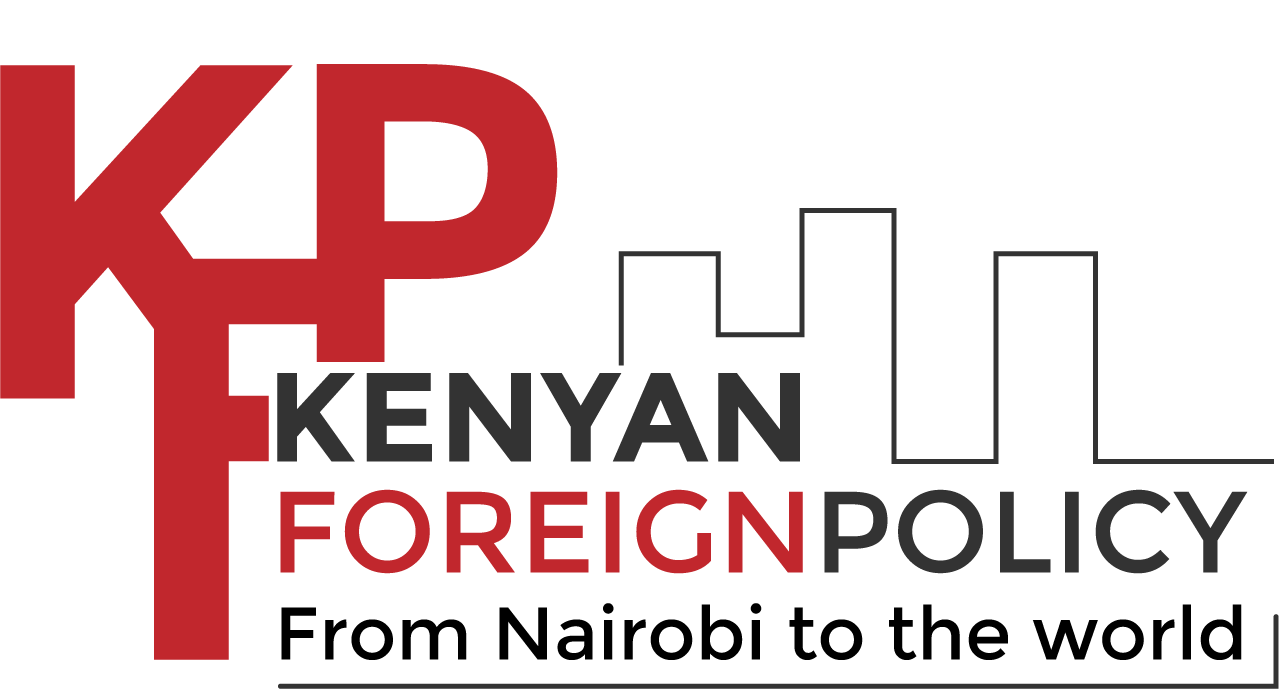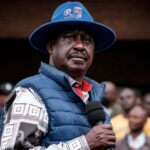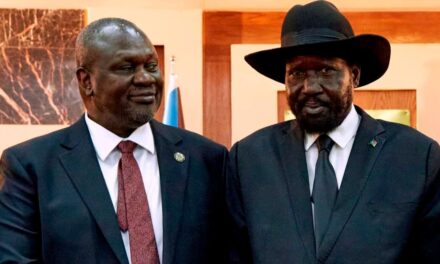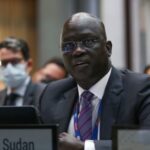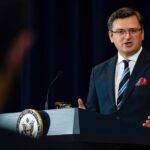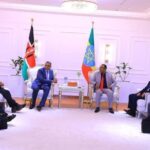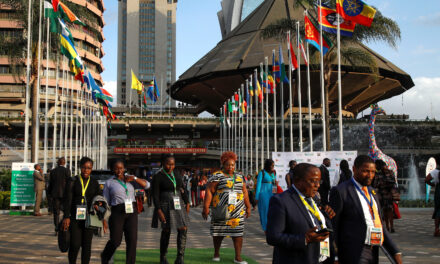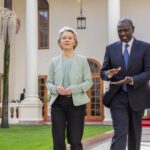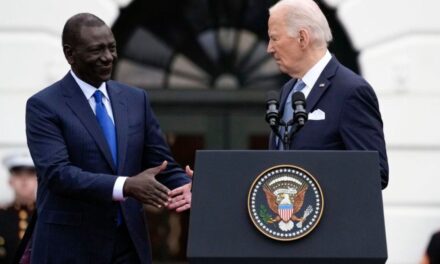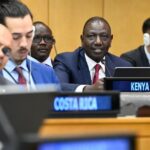

How Principles, Not Transactions, Should Guide Kenya’s Foreign Policy
| May 13, 2024

Kenya’s outgoing UN envoy, Martin Kimani during a past event. Photo: Handout
In his May 7th opinion piece in the Sunday Nation (‘Kenya must put its money where its mouth is in renewed Cold War’), Dr. Peter Kagwanja critiques Kenya’s vacillation between “megaphone diplomacy” and “strategic ambiguity” in foreign policy.
He provides an opportunity to assess the balance between principle and transaction, particularly in reflecting on my tenure as Permanent Representative at the Kenyan Permanent Mission in New York.
Dr Kagwanja is a distinguished commentator, and his insights are valuable in a foreign policy arena that is notoriously complex and opaque.
He characterises Kenya’s condemnation of a Russian UN Security Council veto concerning North Korea and our pre-invasion speech on Ukraine, as megaphone diplomacy, which he suggests was aimed to appease Western interests.
He contrasts this with “strategic ambiguity,” where Kenya engages economically with Russia and Belarus, and H.E. President William Ruto meets with Ukraine’s H.E. President Zelensky while supposedly avoiding the Russia-Africa and BRICS Summits.
According to Dr. Kagwanja, this strategic ambiguity has advanced our interests, as evidenced by our receipt of wheat from Ukraine and fertiliser from Russia. He advocates for more of the same, particularly with the BRICS, pointing to their economic and demographic strengths.
Kagwanja’s argument, cloaked in the guise of pragmatism, upon closer inspection, recommends that Kenya undertake a series of opportunistic pirouettes for favors from the world’s wealthy.
This tactical oscillation, often passionately defended as hard-headed practicality, fails to grasp that today’s gratification by one aid package or the other might lead to great dangers or even mortgage our future independence and security.
I think it also inaccurately paints Kenya’s diplomatic shifts as vacillations driven by sheer opportunism, without providing sufficient evidence or context.
The truth is that pivoting and turning toward every seeming advantage in a play with so many actors, all bent on pursuing their interests, is extremely difficult.
The North Star that will most reliably steer effective Kenyan foreign policy is the recognition that our principles fundamentally align with our real economic, security, and political interests, rather than opposing them.
I am not a fan of Henry Kissinger but I enjoyed Niall Ferguson’s pair of books on him, which argue that his characterisation as a pure realist was more accurately a blend of realism and principle, and highlighting the struggle to balance the two.
In New York, we have been very conscious of the need for this balance.
In the last two years, we have spoken at the General Assembly about Security Council vetoes but not in opposition to any one country.
Rather we have participated to advance our long-term interests in a principled manner, as one of the original delegations involved in the passage of the landmark April 2022 Resolution 76/262.
Known as the Veto Initiative, it aims to hold the five permanent Council members accountable for their use of the veto.
This aligns with President Ruto’s repeated insistence on the need to reform the Security Council to make it more accountable and democratic.
During our 2021 and 2022 Security Council term. We were regarded as an independent, principled, and effective delegation, including by all permanent members.
Our autonomy subjected us to pressure and stress (it is always easiest to go along to get along), but it also taught us that principles expressed adroitly, proactively, and in a collaborative manner that forges alliances with like-minded countries, are the surest path to success for those lacking immense wealth and vast military and militant resources they are prepared to employ.
Contrary to the beliefs of many, including some of its diplomats, Kenya has thrived when it has stood firm on its principles.
Our most effective diplomacy has been fueled by the understanding that sometimes you have to be radical to be pragmatic.
For instance, in Mr. Donald Kaniaru’s enlightening book ‘Kenya in the 1973-1974 Security Council’, which should be essential reading for all Kenyans, he recalls Kenya as a leader in the Council in opposing South Africa’s apartheid regime and the colonial tactics of Portugal in Southern Africa. Mzee Jomo Kenyatta even once threatened to sever diplomatic ties with Israel over its occupation of Palestinian and Arab territories.
It’s no coincidence that during this era, Kenya secured the right to host the United Nations Environment Programme (UNEP), becoming the only country, to date, in the Global South to house a UN headquarters.
Leadership that aligns with the aspirations of many countries and peoples garners support, enabling the pursuit of greater, more noble objectives that truly reflect the aspirations of our people.
Kenya recently voiced critiques of Russia for its vetoing the DPRK Panel of Experts, but we also condemned the vetoes by the US against resolutions for a ceasefire in Gaza and for questioning whether the Security Council’s decisions are binding.
We have stood with the cause of Palestinian self-determination while condemning the terrorism of Hamas and the breaking of International Humanitarian Law by Israel’s military in Gaza.
This is not megaphone diplomacy; it’s what is done by ambitious countries with a desire to build a global community more amenable to their peace, security, and democracy.
A further example linking our history to our present diplomatic posture will suffice.
Our nation’s history, particularly during the 1970s, was marked by persistent threats to our territorial integrity by neighboring states. In this context, Kenya’s recent stance on the invasion of Ukraine and similar violations of the UN Charter is a principled stand and also a strategic necessity.
As diplomats, we are the initial guardians of our nation’s sovereignty, endeavouring to resolve conflicts through diplomacy so that the deployment of Kenya Defence Forces
remains a distant and undesirable last resort. By articulating a clear and firm position in the Security Council, we affirmed our commitment to our own sovereignty and also defended the multilateralism that is so necessary to our security.
In those six minutes on the global stage, Kenya wielded the foundational values of its constitution to advance its national security.
I pray that we never embrace the zigzagging path of convenience under the guise of “strategic ambiguity”. This kind of diplomacy may be seductive for a country with so many immediate needs, but it ultimately places Kenya in a perilous position by rushing into short-term bargains at the expense of our longer-term sovereignty and international standing.
A preferable approach is to sustain H.E. President Ruto’s current direction of redefining Kenya’s role on the global stage, especially in terms of equity and fairness by the world’s multilateral institutions, advancing green growth, and shaping a new deal between wealthy countries and developing ones.
His approach builds on and innovates the foreign policies of his predecessors, Presidents Uhuru Kenyatta and Mwai Kibaki.
President Ruto is challenging the traditional narrative that countries must industrialize first and clean up later, advocating instead for green development from the start. He is also pushing for reforms in powerful global financial institutions and the Security Council, while positioning Africa as a source of solutions, not just a recipient of aid.
The mission to Haiti, for instance, is poised to reshape the next generation of UN peacekeeping. While boldness and agency may not win over everyone, Africa and its people will never rise without taking the less trodden path towards sustained independence and prosperity.
The truth is, we need fear no one. We are 50 million strong and home to some of the world’s smartest, proudest, and hardest-working people.
Our true diplomatic strength does not come from dancing to the tune of any one country’s band — whether ‘Western’ or ‘Eastern’. Instead, it is our steadfast adherence to principles — our greatest hard interest — that will define our nation’s character and enable our agency to secure the wealth and security we desire.
The great opportunity for us lies in charting a course that others might follow, particularly in Africa and the Global South, where there is a profound desire for a bold, Pan-Africanist Kenya to act as an honest broker and a determined advocate for transforming the terms of engagement that Africans have with the world.
Pan-Africanists have long understood that Africa’s long-term prosperity and security depend on dismantling the persistent and deadly hierarchy where Africa is always relegated to the bottom.
It requires principle to find the basis of unity and determination to manifest such a world. We once believed we could make a real difference. Now, a quarter of the way into this century, it’s time to recommit to the cause of making that difference.
The writer is Kenya’s outgoing Permanent Representative to the United Nations.
Your support empowers us to deliver quality global journalism. Whether big or small, every contribution is valuable to our mission and readers.
